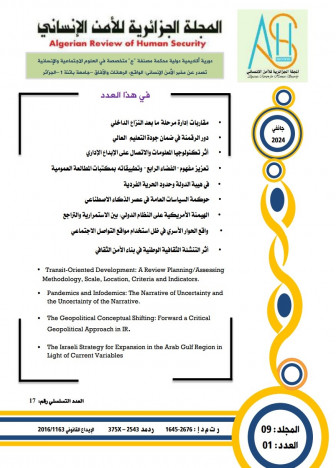تعزيز مفهوم " الفضاء الرابع " وتطبيقاته بمكتبات المطالعة العمومية الجزائرية ما بعد كوفيد 19: المكتبة الرئيسية للمطالعة العمومية لولاية أدرار نموذجا
DOI:
https://doi.org/10.59791/arhs.v9i1.3785الكلمات المفتاحية:
المكتبات العمو مية، الفضاء الرابع، المكتبات الرئيسية، كو فيد 19، الجزائرالملخص
تمر المكتبات العمومية الجزائرية بنفس القيود التي تعرفها المكتبات في العالم إثر تفشي جائحة كوفيد 19، والتي تجعلها أمام حتمية إعادة التفكير في الشكل والصيغة التي تقدم بها خدماتها في البيئة الرقمية. يلجأ القائمين على المكتبات عادة، ومجتمع البحث المشتغلين في حقل المكتبات والمعلومات دائما إلى التجارب الدولية الناجحة والرائدة لتطوير وابتكار الخدمات الرقمية، وكذلك لحل الأزمات والمشاكل التقنية التي تمر بها هذه الفضاءات. يأتي مفهوم الفضاء الرابع في سياق هذه الجهود الموجهة لترقية مكانة وخدمات المكتبات الجزائرية، حيث نحاول الوقوف من خلال هذه الورقة العلمية على خصائص ومكونات هذا النموذج الجديد، وتحديد بعض المؤشرات والقرائن التي تبرز ملامحه، لنقوم على هذا أساس بتقريب خدمات المكتبات العمومية الجزائرية من منطق وفلسفة الفضاء الرابع، وقد تم العمل والتركيز في هذا السياق على تجربة المكتبة الرئيسية للمطالعة العمومية المجاهد المرحوم الهاشمي قويدر لولاية أدرار وذلك للمكانة التي تحظى بها في سياسة السلطات الوصية الموجهة لعصرنة ورقمنة شبكة المكتبات، وكذلك لما تقدمه هذه المكتبة من مشاريع ابتكارية ريادية، وخدمات رقمية متقدمة. تشير نتائج هذه الدراسة إلى أنه لا يوجد إرادة سياسية قوية لنشاط هذه المكتبات في الفضاء الرقمي، إذ لا نجد مشاريع رقمية حقيقية مع عودة نشاط هذه المكتبات في الفضاء المادي ما بعد كوفيد 19.





